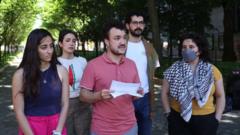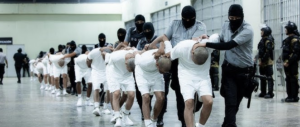Three Americans, previously condemned to death for a coup attempt in the Democratic Republic of Congo last year, have been returned to the U.S. as their sentences were commuted to life imprisonment. This repatriation highlights the complexities of U.S.-Congo relations amid ongoing security and political challenges in the region.
Congo Sends Back American Citizens Sentenced in Failed Coup

Congo Sends Back American Citizens Sentenced in Failed Coup
Three U.S. citizens, previously sentenced to death for their involvement in an attempted coup in the Democratic Republic of Congo, have been repatriated after receiving clemency.
The Democratic Republic of Congo recently repatriated three American citizens previously sentenced to death for their involvement in a failed coup attempt in May 2024. According to a spokeswoman for the Congolese presidency, the men — Marcel Malanga, Tyler Thompson, and Benjamin Zalman-Polun — had their death sentences commuted to life imprisonment and were flown back to the United States on Tuesday.
The men were among a group of 37 individuals sentenced to death after a violent assault on the Congolese government that included a fierce gunfight near the presidential palace. Their repatriation follows an offer from Congo's President Felix Tshisekedi, who seeks U.S. investment in his country’s extensive mineral resources amid ongoing armed conflict, including issues pertaining to the M23 armed group, allegedly backed by Rwanda.
Tammy Bruce, a spokesperson for the U.S. State Department, confirmed that the three men are now in U.S. custody, although details about their imprisonment within the country remain unclear. This exchange occurred shortly after an American diplomatic mission met with Congolese officials. Senior adviser for Africa, Massad Boulos, indicated that discussions around U.S. investment in Congo's minerals, essential for renewable energy efforts, would advance in coming negotiations.
The attempted coup, which was ultimately thwarted by Congolese authorities, resulted in the death of the coup leader, Christian Malanga, while his son, Marcel, maintained that he and Thompson were unwittingly drawn into the plot during a visit to the country. Benjamin Zalman-Polun was noted to be a business associate of Christian Malanga.
The U.S. government's handling of this unusual situation, combining aspects of international diplomacy, negotiations concerning mineral wealth, and the capture of American citizens, reflects ongoing complexities in U.S.-Congo relations and broader geopolitical considerations in Central Africa.
The men were among a group of 37 individuals sentenced to death after a violent assault on the Congolese government that included a fierce gunfight near the presidential palace. Their repatriation follows an offer from Congo's President Felix Tshisekedi, who seeks U.S. investment in his country’s extensive mineral resources amid ongoing armed conflict, including issues pertaining to the M23 armed group, allegedly backed by Rwanda.
Tammy Bruce, a spokesperson for the U.S. State Department, confirmed that the three men are now in U.S. custody, although details about their imprisonment within the country remain unclear. This exchange occurred shortly after an American diplomatic mission met with Congolese officials. Senior adviser for Africa, Massad Boulos, indicated that discussions around U.S. investment in Congo's minerals, essential for renewable energy efforts, would advance in coming negotiations.
The attempted coup, which was ultimately thwarted by Congolese authorities, resulted in the death of the coup leader, Christian Malanga, while his son, Marcel, maintained that he and Thompson were unwittingly drawn into the plot during a visit to the country. Benjamin Zalman-Polun was noted to be a business associate of Christian Malanga.
The U.S. government's handling of this unusual situation, combining aspects of international diplomacy, negotiations concerning mineral wealth, and the capture of American citizens, reflects ongoing complexities in U.S.-Congo relations and broader geopolitical considerations in Central Africa.





















